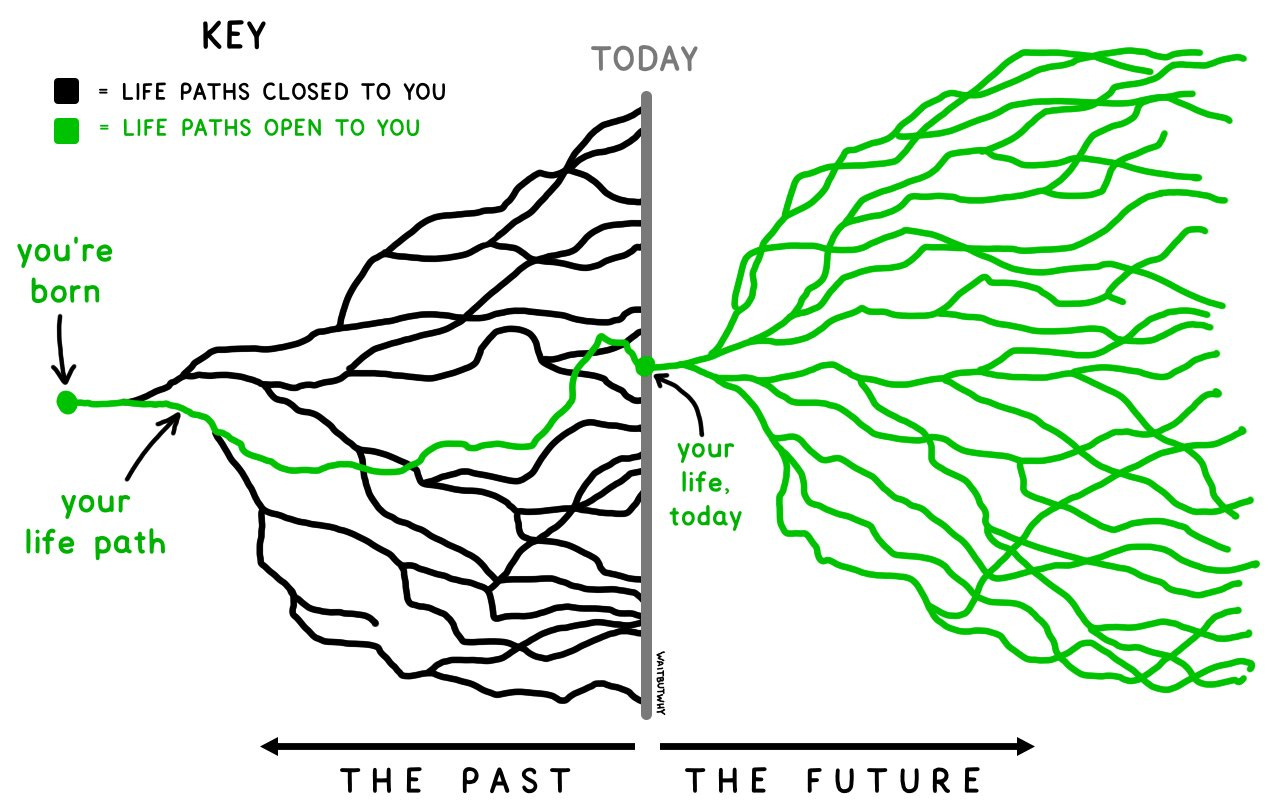The Path of Fear (plus my favorite year-end exercise)
Finding clarity and focus for 2024.
I love New Year’s Day. The streets are quiet and the schedule empty. The day invites reflection and big dreams. The grand empty canvas of an entire new year is waiting to be filled with hopes and ambitions. What a beautiful moment to indulge and contemplate all the ways in which your life could unfold (cue my favorite picture by Tim Urban).
In the past two years, I shared different ways to approach the new year. 2022 was about goals and surrendering to flow. In 2023, I focused on asking uncomfortable questions. This year, I want to tackle a long-time stumbling block of mine.
If you ask me to write down goals for the new year, I immediately fall prey to the planning fallacy. There’s not enough time in a decade to do everything I come up with.
I should know better. After all, I wrote an entire piece on focus. Success lies at the intersection of knowing what’s important and not getting distracted.
Macro focus asks you to discover what is important. Micro focus requires you to remember it at all times. One without the other can be disastrous. Combining both with consistent effort will unlock a compounding force beyond imagination. Mastering dual focus may be one of the most important skills you can develop. — Focus, the last superpower
I recounted an apocryphal conversation between Buffett and his pilot who made a list of 25 goals. Instead of dropping the 20 least important ones, he spread himself thin and made time for all of them. Well, too often I am that pilot.
I resist dropping a goal I’ve already imagined myself accomplishing. It’s like throwing out a beautiful piece of furniture you’ve already assembled in the palace of your mind.
But I know I have to be ruthless.
Which brings us to the issue of knowing which of the goals to let go of?
This used to be a big issue for me. Now I use a trick born out of my struggles: I have a conversation with my fear.
Over the past year, I’ve spent a lot of time in group settings at workshops, retreats, and events (meditation, psychedelics, breath work, stuff like that). At the end, there’s usually time to share, but often not time for everyone. This creates a conundrum: should I speak up? Is it important that I share or does my ego just want to be seen?
In the beginning, I often felt a wave of fear. It was like sitting in a circle with strangers and making introductions. That used to be my nightmare. My heart would jump every time a person closer to me started talking. I would beg my brain to come up with something clever while feeling the spotlight creep towards me. Then it would be my turn and I’d kind of black out and stumble through pronouncing my own name. Good job, brain.
Anyway, I realized that when I had the option to share, fear became a signal.
If I feel nothing, it’s time to be quiet and listen.
If on the other hand I feel fear rising like a hot wave, if my heart starts racing, that’s when I need to share. Fear signals that I have something genuine to say, often something very personal that comes with feelings of shame or embarrassment. Resistance means the next moment requires courage. And mustering the courage is the point. That’s the test.
Once you figure out that inner resistance rises proportionally with the importance of what you’re contemplating, a lot of decisions become clearer.
Go for fear. Every time. This doesn’t make the work easier. On the contrary, going for fear will reliably guide you to discomfort. But it will guide you to what’s important. And having clarity is invaluable.
The law of resistance
There’s a few different ways to look at this idea.
First, I’m not talking about the rational and appropriate fear of being harmed. I’m not talking about real risks like walking across the highway at night, betting your money on red, or taking pills from strangers at clubs.
I’m talking about the fear that keeps us locked in our habits, our identity, our jobs, our relationships, whether we’re happy, miserable, or indifferent. I’m talking about fear of change, fear of failure, fear of being shamed, judged, and ridiculed. I’m talking about the fear of being exposed, vulnerable and hurt emotionally. I’m talking about the primal fears of being rejected by your tribe, of feeling unworthy, unloved, unseen.
I’m talking about the barrage of doubt and resistance when you contemplate the important and difficult:
How could I even dare to think about this? I’m not good enough, I don’t know enough, I’m a fraud.
What if I mess up? What if I look ridiculous? What if people laugh at me?
What if nobody likes it? What if nobody shows up?
What if too many people like it? What if I become a one hit wonder? What if my family and friends resent my success and I end up alone?
I think of this kind of fear as a force, like Newton's third law of motion: for every action, there exists an equal and opposite reaction. For every potential that’s sleeping within you, there exists an equal resistance.
Think of it as the angle of your invisible path. The further up you want to climb, the steeper the angle. Aim for the moon and your body will be screaming to just sit on the couch with your phone instead.
Three versions of you
Think back to a moment of regret, a situation in which you wish you’d acted. You didn’t make the call, take the job, start the company, adopt the dog, kiss the girl/boy. You didn’t make the move. You probably felt a little nudge at the time, the subtle tug of your intuition telling you to act. But you didn’t. Resistance won.
Consider that in the future, you are going to contemplate today and all the choices you face. What if right now you’re being encouraged by your future self to choose what’s important? Your future self knows which of the many options are important. Maybe your resistance is fear. Or maybe there’s a future version of you, wiser, thinking of you, hoping you make the right choice (or regretting you didn’t!). Whether you believe it or not, it could be a useful way to interpret your feelings.
Now consider that anxiety and excitement feel pretty much the same (drink too much coffee and you know what I mean). Professor Alison Wood Brooks found that we can use this to our advantage. People typically believe the best way to manage performance anxiety is to try and calm down. But that’s a different state of arousal and better done through practices that change your state (say, regulating your breath) than talking to yourself. What is effective is to reframe your anxiety as excitement.
… the way we talk about our feelings influences whether we feel anxious or excited, which dramatically influences subsequent performance. … Compared with reappraising anxiety as calmness or not reappraising anxiety at all, reappraising anxiety as excitement increased the subjective experience of excitement and improved performance in three important performance domains: singing, public speaking, and math. — Get Excited: Reappraising Pre-Performance Anxiety as Excitement
“Individuals can reappraise anxiety as excitement,” she wrote, “using minimal strategies such as self-talk (e.g., saying “I am excited” out loud) or simple messages (e.g., “get excited”).” This self-talk leads to a change in mindset from “threat” to “opportunity” and opens the door to a different take on fear as a signal.
What if, when contemplating important goals, our anxiety is really a reflection of secret excitement? What if a part of you feels that you are finally tapping into your full potential? What if the signal is excitement which we mis-interpret as anxiety?
It’s a simple idea: resistance increases with importance. Invert it. What doesn’t create the kind of anxiety you could reframe as excitement? That’s right, all the stuff that doesn’t really matter. Everything that is familiar and comforting. All the situations in which the stakes are low. All the fleeting pleasures, the shopping, the eating out, the socializing without being vulnerable and connecting deeply, the travel done for Instagram. Also, all the work you know by heart.
Fear allows you to kill the goals you only think you want. The absence of fear exposes memetic (and thus inauthentic) goals. Your subconscious already knows they’re not really yours and that whether you succeed or fail at them doesn’t really matter. If the goal doesn’t resonate emotionally, toss it.






